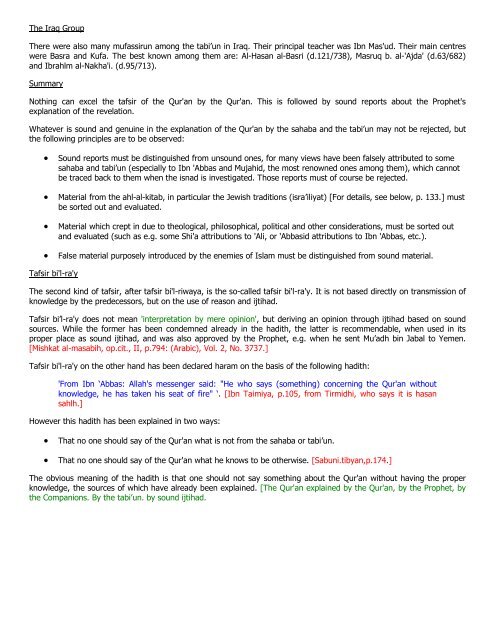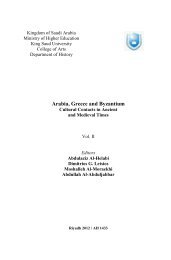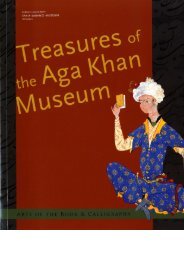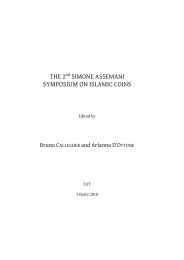ulum-al-quran
ulum-al-quran
ulum-al-quran
You also want an ePaper? Increase the reach of your titles
YUMPU automatically turns print PDFs into web optimized ePapers that Google loves.
The Iraq Group<br />
There were <strong>al</strong>so many mufassirun among the tabi’un in Iraq. Their princip<strong>al</strong> teacher was Ibn Mas'ud. Their main centres<br />
were Basra and Kufa. The best known among them are: Al-Hasan <strong>al</strong>-Basri (d.121/738), Masruq b. <strong>al</strong>-'Ajda' (d.63/682)<br />
and Ibrahlm <strong>al</strong>-Nakha'i. (d.95/713).<br />
Summary<br />
Nothing can excel the tafsir of the Qur'an by the Qur'an. This is followed by sound reports about the Prophet's<br />
explanation of the revelation.<br />
Whatever is sound and genuine in the explanation of the Qur'an by the sahaba and the tabi’un may not be rejected, but<br />
the following principles are to be observed:<br />
<br />
<br />
<br />
<br />
Sound reports must be distinguished from unsound ones, for many views have been f<strong>al</strong>sely attributed to some<br />
sahaba and tabi’un (especi<strong>al</strong>ly to Ibn 'Abbas and Mujahid, the most renowned ones among them), which cannot<br />
be traced back to them when the isnad is investigated. Those reports must of course be rejected.<br />
Materi<strong>al</strong> from the ahl-<strong>al</strong>-kitab, in particular the Jewish traditions (isra’iliyat) [For details, see below, p. 133.] must<br />
be sorted out and ev<strong>al</strong>uated.<br />
Materi<strong>al</strong> which crept in due to theologic<strong>al</strong>, philosophic<strong>al</strong>, politic<strong>al</strong> and other considerations, must be sorted out<br />
and ev<strong>al</strong>uated (such as e.g. some Shi'a attributions to 'Ali, or 'Abbasid attributions to Ibn 'Abbas, etc.).<br />
F<strong>al</strong>se materi<strong>al</strong> purposely introduced by the enemies of Islam must be distinguished from sound materi<strong>al</strong>.<br />
Tafsir bi'l-ra'y<br />
The second kind of tafsir, after tafsir bi'l-riwaya, is the so-c<strong>al</strong>led tafsir bi'l-ra'y. It is not based directly on transmission of<br />
knowledge by the predecessors, but on the use of reason and ijtihad.<br />
Tafsir bi’l-ra'y does not mean 'interpretation by mere opinion', but deriving an opinion through ijtihad based on sound<br />
sources. While the former has been condemned <strong>al</strong>ready in the hadith, the latter is recommendable, when used in its<br />
proper place as sound ijtihad, and was <strong>al</strong>so approved by the Prophet, e.g. when he sent Mu’adh bin Jab<strong>al</strong> to Yemen.<br />
[Mishkat <strong>al</strong>-masabih, op.cit., II, p.794: (Arabic), Vol. 2, No. 3737.]<br />
Tafsir bi'l-ra'y on the other hand has been declared haram on the basis of the following hadith:<br />
'From Ibn ‘Abbas: Allah's messenger said: "He who says (something) concerning the Qur'an without<br />
knowledge, he has taken his seat of fire" ‘. [Ibn Taimiya, p.105, from Tirmidhi, who says it is hasan<br />
sahlh.]<br />
However this hadith has been explained in two ways:<br />
<br />
<br />
That no one should say of the Qur'an what is not from the sahaba or tabi’un.<br />
That no one should say of the Qur'an what he knows to be otherwise. [Sabuni.tibyan,p.174.]<br />
The obvious meaning of the hadith is that one should not say something about the Qur'an without having the proper<br />
knowledge, the sources of which have <strong>al</strong>ready been explained. [The Qur'an explained by the Qur'an, by the Prophet, by<br />
the Companions. By the tabi’un. by sound ijtihad.





